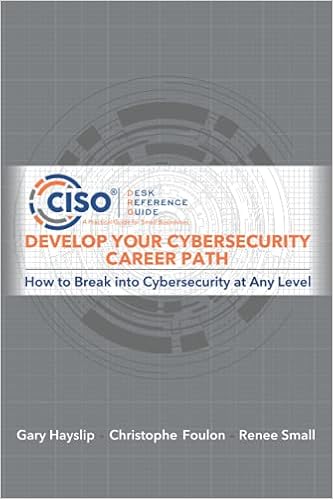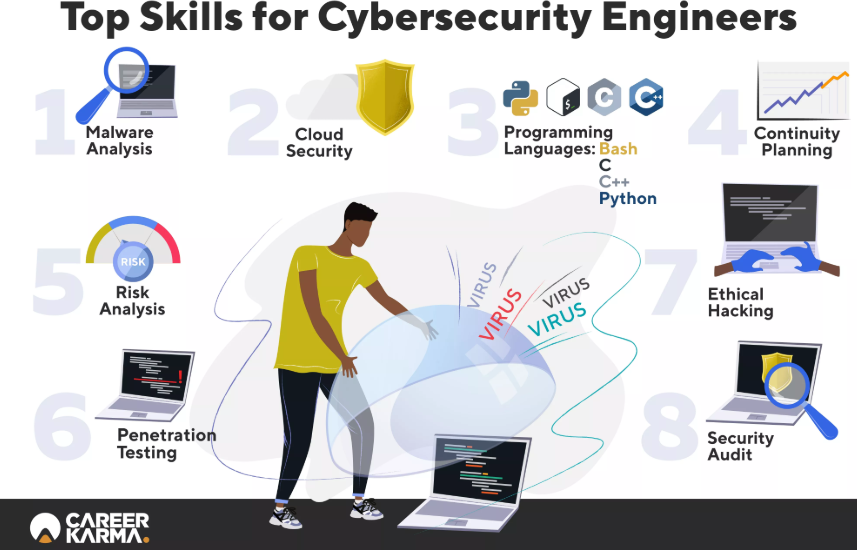Cybersecurity jobs available right now…
Applied Cryptographer
Quantstamp | EMEA | Remote – View job details
As an Applied Cryptographer, you will research about various cryptographic protocols and have knowledge of cryptographic primitives or concepts, like elliptic curve cryptography, hash functions, and PCPs. You should have experience with at least one major language, like Rust, Python, Java, or C; the exact language is not too important. You should be familiar with versioning software (specifically, GitHub), testing, and a familiarity with algorithms and data structures.

Cloud Security Specialist
KMS Lighthouse | Israel | On-site – View job details
As a Cloud Security Specialist, you will design, implement, and manage Azure and Microsoft 365 security solutions. Monitor security alerts, lead incident response, and conduct regular assessments. Ensure compliance with ISO 27001, SOC2 Type II and NIST standards.

CISO
CYBERcom | Israel | Hybrid – View job details
As a CISO, you will develop and implement comprehensive cybersecurity policies and procedures. Ensure compliance with relevant regulations and standards (e.g., GDPR, ISO 27001). Conduct risk assessments and develop mitigation strategies. Advise on security best practices and emerging threats. Collaborate with clients to enhance their security posture.
Cyber Range Lead
Booz Allen Hamilton | Japan | On-site – No longer accepting applications
As a Cyber Range Lead, you will lead a team of professionals as they use cyberspace capabilities to evaluate potential weaknesses as well as the effectiveness of mitigations for cyber security solutions. You will leverage cyberspace operations systems to aggregate threat feeds that inform briefings for senior leadership aligned to our client’s mission area.

Cybersecurity Technical Consultant
Thales | Mexico | Hybrid – View job details
As a Cybersecurity Technical Consultant, you will provide onsite or remote consulting services and support to Thales customer with a focus on high quality, accuracy and customer satisfaction. Develop and deliver technical hands-on product deep knowledge transfer to customers. Track and ensure successful completion of high impact projects by creating project scoping plans, design guides and relevant documentation.

Cyber Security Advisor
H&M | Sweden | On-site – View job details
As a Cyber Security Advisor, you will conduct security assessment of in-house developed and/or by third-party provided solutions in order to ensure that they are in compliance with H&M’s security standards. Conduct security maturity and risk assessment for internal and external partners.

Cyber Security Engineer
PetroApp | Egypt | Remote – View job details
As a Cyber Security Engineer, you will develop and implement cyber security policies, procedures, and controls to protect the company’s digital assets. Conduct Pen-tests, monitor network traffic and security alerts to detect and respond to potential security breaches. Perform vulnerability assessments and penetration testing to identify and remediate security vulnerabilities. Conduct regular audits of security systems and processes to ensure compliance with industry standards and regulations.

Cyber Security Governance Risk & Compliance Manager
Munster Technological University | Ireland | On-site – View job details
As a Cyber Security Governance Risk & Compliance Manager, you will develop, implement, and maintain a robust IT governance, risk, and compliance framework in line with industry best practices and regulatory requirements. Drive risk maturity through project lifecycle and provide independent assessments, challenge inherent risks in material changes e.g., business decisions, projects, process changes, implementation of new systems, applications, and infrastructure.

Cyber Security Instructor
ABM College | Canada | On-site – View job details
As a Cyber Security Instructor, you will create dynamic classroom learning experiences using various teaching strategies to facilitate adult learners in achieving learning objectives in accordance with the program objectives as set out in the curriculum. Ensure students are motivated to learn and to maximize their potential. Develop different classroom strategies to ensure knowledge and skills acquisition and retention.

Digital Forensics and Incident Response Analyst
Accenture | Philippines | On-site – View job details
As a Digital Forensics and Incident Response Analyst, you will perform incident response to cybersecurity incidents, including but not limited to APT & Nation State attacks, Ransomware infections and Malware outbreaks, Insider Threats, BEC, DDOS, Security and Data breach, etc. Conduct in-depth investigations of cybersecurity incidents, identifying the root cause, the extent of the impact, and recommended actions for containment, eradication, and recovery, and providing a final report that contains recommendations on how to prevent the same attack in the future by strengthening security posture.

Director of Information Security, Cyber Risk and Compliance
S&P Global | Italy | On-site – No longer accepting applications
As a Director of Information Security, Cyber Risk and Compliance, you will become familiar with the Cyber Risk and Compliance team activities and Market Intelligence regarding SOC reporting, relevant regulatory requirements, control frameworks, internal and external audit processes, customer interactions including security questions and audits, and overall company and divisional cyber security processes and controls. Make recommendations related to balancing requirements and deadlines made by corporate departments with human resource and technical capabilities that exist in Market Intelligence. Negotiate differences to find and implement solutions acceptable to both corporate groups and Market Intelligence.

Head of Identity Management Platform
Nexi Croatia | Croatia | Hybrid – View job details
As Head of Identity Management Platform, you will leverage your strong background in Identity and Privileged Access Management, expertise in IT technologies, and in-depth knowledge of IT security to organize and lead complex projects, manage third-party teams, and oversee platform lifecycle activities such as upgrades and integrations.

Head of Consulting
Orange Cyberdefense | Norway | Hybrid – View job details
As a Head of Consulting, you will lead, mentor, and develop a team of cybersecurity consultants, fostering a culture of excellence and continuous improvement. Define and implement the consultancy department’s strategy in alignment with the company’s goals, ensuring the delivery of innovative and effective cybersecurity solutions. Ensure that all consultancy activities adhere to industry standards, regulatory requirements, and best practices, mitigating risks to both clients and the company.

Head of Security CU TH
Ericsson | Thailand | On-site – View job details
As a Head of Security CU TH, you will facilitate execution of and follow up on security strategy, policies & instructions, governance model and frameworks. Support the business in implementation and maintenance of ISO 27001 controls across the CU as per the MA scope and Ericsson Global ISO 27001 control framework. Manage local security incidents and support investigations.

IT Program Manager
Bose Corporation | USA | On-site – View job details
As an IT Program Manager, you will develop, implement, and manage cybersecurity programs in alignment with the organization’s strategic objectives. Oversee the security projects related to enterprise applications, with a focus on safeguarding sensitive data and ensuring compliance with regulatory standards. Facilitate regular security assessments and audits to identify vulnerabilities and implement corrective actions.

Penetration Tester
Navy Federal Credit Union | USA | On-site – View job details
As a Penetration Tester, you will manage penetration tests from inception through delivery. Identify and prescribe remediation for vulnerabilities in NFCU applications, systems, and networks. Leverage complex tactics including, but not limited to, lateral movement, network tunneling/pivoting, credential compromise, and hash cracking.

Principal Data Security Specialist
Oracle | Spain | On-site – View job details
As a Principal Data Security Specialist, you will focus on delivering technical and procedural guidance to assist customers in defining the platform requirement though to realisation of the subscription value. Research and evaluate emerging solutions and services to drive continuous improvement.

Senior Architect – Cyber Security
Presight | UAE | On-site – View job details
As a Senior Architect – Cyber Security, you will develop and implement security architecture solutions to secure the organization’s IT infrastructure. Design and review security policies, standards, and procedures. Conduct security assessments and risk analysis to identify vulnerabilities and recommend mitigation strategies. Lead security projects and collaborate with cross-functional teams to integrate security measures.

Senior CyberSecurity Architect
Hexagon Geosystems | European Economic Area | Remote – View job details
As a Senior CyberSecurity Architect, you will plan, organize, test, and document the implementation of new security systems and tools; define the success criteria and security requirements, and develop reference architecture, functional and non-functional requirements for proof-of-concept efforts and projects. Lead in performing threat modeling, security architecture review, and risk assessments of new and existing technical solutions.

(Senior) Information Security Officer
Oetker Digital | Germany | Hybrid – View job details
As a (Senior) Information Security Officer, you will develop, implement, and monitor a strategic, comprehensive company information security and IT risk management program, based on the Oetker Group-wide security directive. Manage and assist in the development in implementation of the information security policies, procedures, and guidelines. Provide guidance and counsel to the C-Level, the senior management team, and staff about information security and its alignment with business objectives and risk management.

Technology & Cyber Risk: Senior Officer – Cybersecurity Risk
Citi | Poland | On-site – View job details
As a Technology & Cyber Risk: Senior Officer – Cybersecurity Risk, you will review and evaluate compliance and cyber policies and procedures, technology and tools, and governance processes to provide credible challenge for minimizing losses from cyber risks. Assess cyber risks and evaluates actions to address the root causes that persistently lead to operational risk losses by challenging both historical and proposed practices. Support independent assurance activities to assess areas of concern including substantive and controls testing.

Vulnerability Manager
TTM Technologies | USA | Remote – View job details
As a Vulnerability Manager, you will be responsible for identifying, assessing, prioritizing, and managing vulnerabilities across our systems and networks. Conduct regular vulnerability assessments and penetration tests across our systems, applications, and networks.

Starting Your Cyber Security Career: Building a Successful Career in Cyber Security
Cybersecurity Career Master Plan
InfoSec services | InfoSec books | Follow our blog | DISC llc is listed on The vCISO Directory | ISO 27k Chat bot

















![The Cyber Skill Gap: How To Become A Highly Paid And Sought After Information Security Specialist! by [Vagner Nunes]](https://m.media-amazon.com/images/I/51mKZDGZ9vL.jpg)






